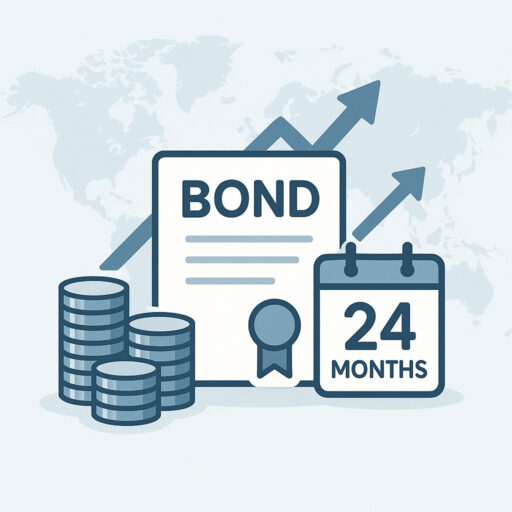The EIGHTClouds Dubai Loan Notes present a high-yield, short-term investment opportunity. However, it’s a high-risk investment that’s only suitable for a certain type of investor.
Prospective investors should carefully weigh the illiquidity, early stage company profile, and elevated risk-return balance.
This review explores EIGHTClouds’ background, bond structure, investment options, and advantages and disadvantages of loan notes.
My contact details are hello@adamfayed.com and WhatsApp +44-7393-450-837 if you have any questions.
The information in this article is for general guidance only and isn’t designed for UAE-residents.
It does not constitute financial, legal, or tax advice, and is not a recommendation or solicitation to invest. Some facts may have changed since the time of writing.
What is EIGHTClouds?
UAE-based EIGHTClouds private equity company has operations structured across:
- Holdings in Abu Dhabi Global Market (ADGM)
- Management in Dubai DMCC
- A DFSA-regulated fund in the pipeline
The firm focuses on investing in consumer-focused businesses within the GCC, helping local entrepreneurs scale their brands regionally and internationally.
Its investment sectors include:
- Consumer care, beauty & wellness, and sustainability
- Food & beverage, clothing & fashion, and hospitality
- Technology, real estate, sports & entertainment, and education
EIGHTClouds is targeting $1 billion in assets under management (AUM) within the next five years.
The firm differentiates itself by offering not only capital, but also post-acquisition support in branding, franchising, marketing, and operational optimization.
EIGHTClouds Dubai Loan Notes Overview

The EIGHTClouds loan notes are a 24-month corporate bond issued by EIGHTClouds Holdings Limited in the Abu Dhabi Global Market (ADGM).
The bond program aims to raise USD 10 million and is backed by a debenture over group assets valued at USD 20 million.
Investors can participate with a minimum investment of USD 50,000, and subscriptions are accepted in US dollars, euros, British pounds, Singapore dollars, and United Arab Emirates dirhams.
The loan notes focus on funding EIGHTClouds’ expansion into consumer brand sectors across the GCC, including hospitality and tech.
EIGHTClouds Investment Options
The bond offers two distinct return profiles, depending on the investor’s preference:
- Growth Strategy
- Return: 15.5% per annum
- No coupons during the term; interest is accrued and paid at maturity.
- Fixed Income Strategy
- Return: 14% per annum
- Biannual coupons, providing regular cash flow.
This structure allows investors to choose between higher compounded returns or steady income.
Pros and cons of EIGHTClouds
Pros
- High Target Returns
- Asset-Backed
- Exposure to fast-growing sectors in the GCC
- Provides a recognized legal framework and governance standards
Cons
- Liquidity risk
- Regional concentration
- Returns above market averages reflect higher risk exposure.
- EIGHTClouds has a short operating history, with ambitious growth targets still untested in the long term.
Conclusion
EIGHTClouds’ Dubai Loan Notes are a high-yield private investment product, offering 14–15.5% annual returns with a 24-month lock-in. The investment is secured against company assets.
However, investors should treat this as a higher-risk, private market bond — suitable only for those who can handle illiquidity and the risk of a relatively new private equity firm.
FAQs
Are loan notes long term?
Loan notes can be either short or long term, depending on the issuing company.
The EIGHTClouds Dubai Loan Notes are a 24-month fixed-term investment, which makes them relatively short term compared to traditional bonds that may run for 5–10 years.
What is the difference between a loan note and a loan?
A loan is a direct borrowing arrangement between a lender and a borrower. A loan note, on the other hand, is a formal debt instrument issued by a company to multiple investors.
Loan notes outline repayment terms, interest (or coupons), and maturity, much like bonds.
Can loan notes be traded?
Most private loan notes, including those issued by EIGHTClouds, are not listed on public exchanges. This means they are illiquid and generally must be held until maturity.
Some agreements may allow transfers, but this depends on the issuer’s terms.
How are loan notes taxed?
Tax treatment varies by jurisdiction. Typically, interest from loan notes is taxable as income, while any gains on sale or redemption may be subject to capital gains tax.
Investors should check local tax rules or consult a tax advisor before investing.
How do I cancel loan notes?
Loan notes are legally binding agreements and usually cannot be canceled early. Investors are committed until the maturity date unless the issuer provides a buy-back option or secondary market access.
With EIGHTClouds, the notes are designed as a 24-month locked investment.
Pained by financial indecision?

Adam is an internationally recognised author on financial matters with over 830million answer views on Quora, a widely sold book on Amazon, and a contributor on Forbes.



